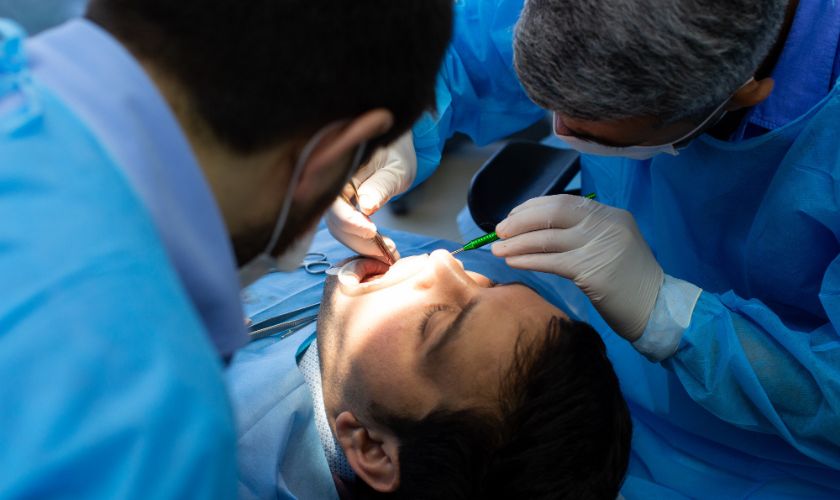Pay Online
Brighter, Healthier Smile with Surgical Orthodontics

Everyone dreams of a perfect smile that not only looks stunning but also functions flawlessly? While traditional braces have been a go-to solution for fixing the misalignment of the teeth, sometimes the appearance of more complex issues require a specialized approach. This is where surgical orthodontics comes in, offering a life-changing solution for individuals, struggling with severe bite problems or jaw discrepancies.
What is Surgical Orthodontics?
Surgical orthodontics, also known as orthognathic surgery, is a collaborative treatment approach that combines the expertise of an orthodontist and an oral and maxillofacial surgeon. It aims to correct jawbone abnormalities and the imperfect positioning of the teeth that traditional braces cannot be addressed effectively alone. This specialized treatment not only enhances your smile’s aesthetics but also improves your oral function, speech, and overall well-being.
Why Might You Need Orthodontic Surgery?
Several factors can necessitate the need of surgery. Here are some common reasons:
- Imperfect positioning of teeth: This refers to a significant misalignment of the upper and lower jaws, leading to functional problems like difficulty in chewing, biting, or speaking.
- Facial asymmetry: Uneven jaw growth can cause noticeable facial imbalances, impacting a person’s self-esteem and confidence.
- Impacted teeth: Teeth trapped within the jawbone due to insufficient space can benefit from surgical intervention for proper eruption.
- Sleep apnea: In some cases, severe jaw discrepancies can contribute to sleep apnea, a potentially life-threatening condition.
- TMJ (Temporomandibular joint) disorders: Orthodontic surgery can help alleviate pain and improve joint function in individuals suffering from TMJ disorders.
Stages of Surgical Orthodontics
If you are considering surgical orthodontics, understanding the treatment stages can help you feel more prepared and informed:
- Consultation and Diagnosis: This initial stage involves a comprehensive evaluation by your orthodontist and oral and maxillofacial surgeon. They will assess your specific needs, discuss treatment options, and create a personalized plan.
- Pre-surgical Orthodontics: In most cases, traditional braces are worn for several months to prepare the teeth for surgical alignment.
- Surgery: The oral and maxillofacial surgeon carefully performs the necessary procedures to reposition the jawbone(s) using advanced techniques and specialized equipment.
- Post-surgical Orthodontics: Braces are typically used for additional months after surgery to fine-tune the tooth positions and ensure optimal bite function.
- Retention: Once the desired results are achieved, retainers are essential to maintain the new tooth and jaw positions for long-term stability.
Procedures Used in Surgical Orthodontics
The specific surgical procedures employed in Rochester, NY, will vary depending on your individual needs. However, some common techniques include:
- Le Fort osteotomy: This procedure involves separating the upper jaw from the skull base and repositioning it for optimal alignment.
- Mandibular osteotomy: This surgery focuses on repositioning the lower jawbone to correct bite problems.
- Genioplasty: This procedure specifically addresses chin prominence or recession by surgically modifying the chin bone.
Aftercare Following Orthodontic Surgery
Following surgical orthodontics in Rochester, NY, proper aftercare is crucial for optimal healing and successful outcomes. Your surgeon will provide detailed instructions regarding:
- Pain management: Medication can help manage any discomfort you may experience after surgery.
- Diet: Following a soft diet for several weeks allows for proper healing and minimizes the risk of complications.
- Oral hygiene: Maintaining meticulous oral hygiene is essential to prevent infection and promote healing.
- Activity restrictions: Avoiding strenuous activity for a specific period is important to allow the surgical site to heal properly.
It’s crucial to remember that every individual’s journey with orthodontic surgery is unique. Consulting with a qualified maxillofacial and surgical orthodontics in Rochester, NY, can help you determine if this treatment is right for you and answer any questions you may have. With careful planning, skilled execution, and proper care, surgical orthodontics can unveil a brighter, healthier smile that not only enhances your appearance but also improves your overall well-being.
